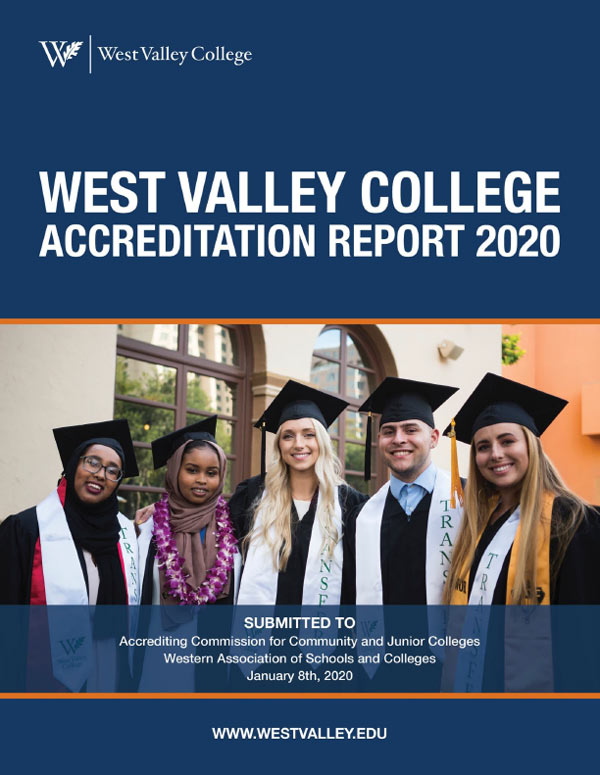- Accreditation Status
- Membership
- Standards
- Resources
- 2024 Midterm Report
- Accreditation 2014
- Documents
West Valley College’s accreditation was reaffirmed in January 2022.
West Valley College’s accreditation was reaffirmed in July of 2020.
West Valley College is accredited by the Accrediting Commission for Community and Junior Colleges (ACCJC), Western Association of Schools and Colleges, 10 Commercial Blvd., Suite 204, Novato, CA 94949, (415) 506-0234, an institutional accrediting body recognized by the Council for Higher Education Accreditation and the U.S. Department of Education.
West Valley College maintains its accreditation by fulfilling criteria that are determined by the ACCJC. Throughout the continuous seven-year review cycle, the college conducts and publishes several review instruments, including an annual report, annual fiscal report, midterm report, comprehensive institutional self-study, and an evaluation review by a team of peers.
Additional information about accreditation, including the filing of complaints against member institutions, can be found at www.accjc.org
Comments may be submitted to ACCJC for review via email at accjc.org/forms/third-party-comments

Note: The ISER report contains links to documents that may not be fully compatible with assistive technologies. If you require assistance accessing the document, please contact the West Valley College President's Office via email at wvc.presidents_officeFREEWEST_VALLEY
of the Western Association of Schools and Colleges
10 Commercial Boulevard, Suite 204
Novato, CA 94949
(415) 506-0234 Phone
(415) 506-0238 Fax
[email protected]
Complaint Policy: Students and members of the public who desire to file a formal complaint to the Commission about one of its member institutions should become familiar with the requirements for doing so prior to contacting the Commission.
The following is a link to the Commission's Policy on Student and Public Complaints Against Institutions along with the appropriate forms. This information will assist the user in understanding the issues the Commission can and cannot address through its complaint process.
Submit complaints against the ACCJC.
Membership
- John Hannigan, Faculty ALO
- Shusaku Horibe, Classified ALO
Standards
Standard I: Mission, Academic Quality and Institutional Effectiveness, and Integrity
The institution demonstrates strong commitment to a mission that emphasizes student learning and student achievement. Using analysis of quantitative and qualitative data, the institution continuously and systematically evaluates, plans, implements, and improves the quality of its educational programs and services. The institution demonstrates integrity in all policies, actions, and communication. The administration, faculty, staff, and governing board members act honestly, ethically, and fairly in the performance of their duties.
Standard II: Student Learning Programs and Support Services
The institution offers instructional programs, library and learning support services, and student support services aligned with its mission. The institution’s programs are conducted at levels of quality and rigor appropriate for higher education. The institution assesses its educational quality through methods accepted in higher education, makes the results of its assessments available to the public, and uses the results to improve educational quality and institutional effectiveness. The institution defines and incorporates into all of its degree programs a substantial component of general education designed to ensure breadth of knowledge and to promote intellectual inquiry. The provisions of this standard are broadly applicable to all instructional programs and student and learning support services offered in the name of the institution.
Standard III: Resources
The institution effectively uses its human, physical, technology, and financial resources to achieve its mission and to improve academic quality and institutional effectiveness. Accredited colleges in multi-college systems may be organized so that responsibility for resources, allocation of resources, and planning rests with the district/system. In such cases, the district/system is responsible for meeting the Standards, and an evaluation of its performance is reflected in the accredited status of the institution(s).
Standard IV: Leadership and Governance
The institution recognizes and uses the contributions of leadership throughout the organization for promoting student success, sustaining academic quality, integrity, fiscal stability, and continuous improvement of the institution. Governance roles are defined in policy and are designed to facilitate decisions that support student learning programs and services and improve institutional effectiveness, while acknowledging the designated responsibilities of the governing board and the chief executive officer. Through established governance structures, processes, and practices, the governing board, administrators, faculty, staff, and students work together for the good of the institution. In multi-college districts or systems, the roles within the district/system are clearly delineated. The multi-college district or system has policies for allocation of resources to adequately support and sustain the colleges.
Resources
| Task | Time |
|---|---|
| Resume Accreditation and Institutional Effectiveness (AIE) meetings | April 2023 |
| AIE develops and approves the report preparation process & timeline and identifies a writing team that includes at least one member from each constituency (faculty, classified, management) | April 2023 |
| Present timeline to CC, AS, CS, ASWVC as information | April – May 2023 |
| Prepare rough draft of Midterm Report | May – July 2023 |
| Writing team solicits preliminary input from: SLAPEC Co-Chair | Academic Senate President | Classified Senate Executive Team | Chancellor | July – August 2023 |
| Work with Editor to edit and prepare the completed draft, including evidence linking | September – October 2023 |
| Review completed draft and agrees on the communication and feedback gathering strategy (via web form). | October 2023 |
Completed draft presented for information (first meeting) and approval (second meeting)
|
November – December 2023 |
| Writing Team considers the feedback and completes final draft | November 28 – December 10, 2023 |
| Work with graphic design team to produce final version | December 2023 – January 2024 |
| Midterm Report presented to Board of Trustees with Mission College | February 2024 |
| Submit completed report to ACCJC | March 14, 2024 |
